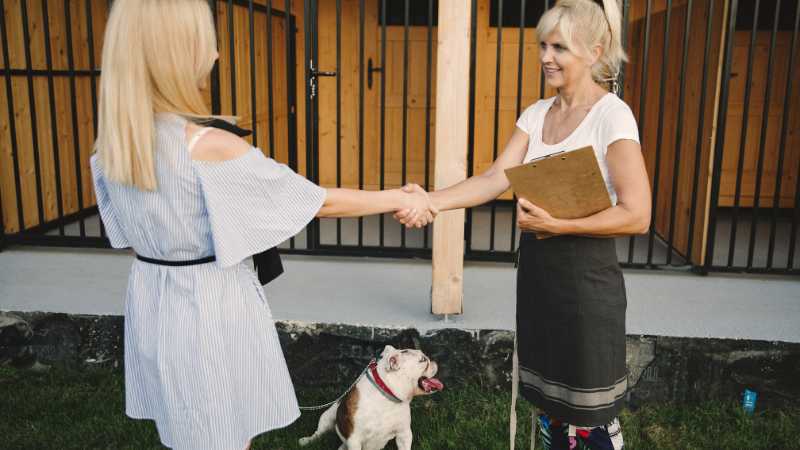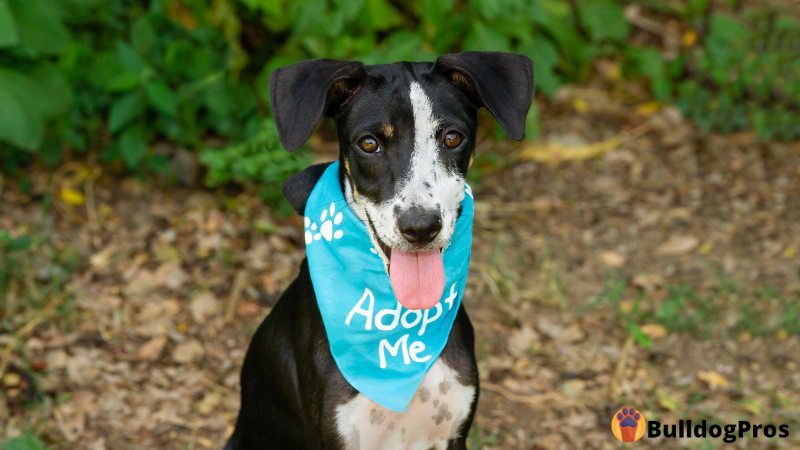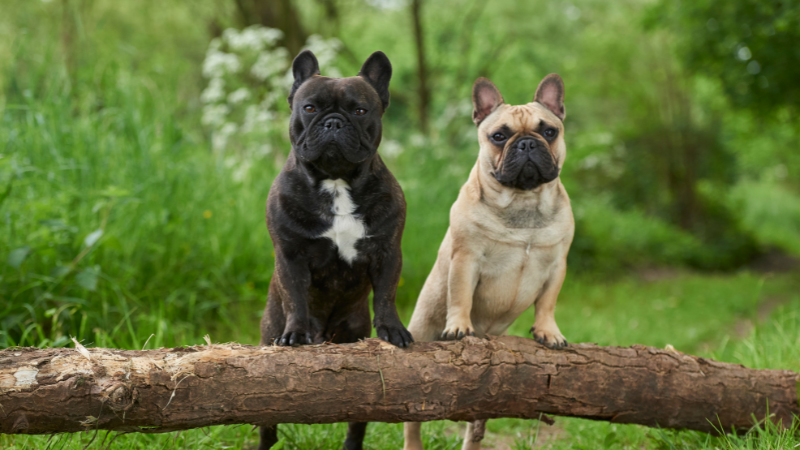Choosing the right dog breeder is crucial for anyone looking for a new pet. Not all dog breeders are good, and not all good dog breeders will have the dog you’re looking for. As dog parents, it’s essential to do your research on choosing the right breeder for you and your new dog.
But choosing the right dog breeder can be a daunting task. However, the process will be much easier with a bit of research and following some guidelines. Following the guidelines in How To Choose the Right Dog Breeder will help you make the best possible decision for your family.
There are many scams out there, so it is important to vet the breeder thoroughly before making an agreement. By doing your homework beforehand, you can avoid any potential problems down the road and find the perfect puppy.
First Things First

Before considering a puppy you first need to find a breed that is compatible with your wants and needs.
Two things to consider are the temperament and energy level of the dog.
What Is This Breed’s Temperament and Energy Level Like?
Be sure to ask around before making a purchase – you’ll want to get as much information as possible about the breed you’re considering.
An energetic dog that is also calm in public will be better suited for someone who wants a pet and not a working animal.
In addition, temperament is one of the most important factors to consider when choosing any dog breed – don’t buy something simply because it’s cute or adorable!
Take time to read up on what different types of breeds are, like their temperaments and energy levels, so that you can make an informed decision.
There are many resources that you can use when deciding on a breed.
Resources
Local Breed Clubs
Breed clubs are a great way to connect with dog breeders and get information on different breeds of dogs. In addition, if you’re looking for a good dog and find the right breeder, being registered with a club will also ensure that your dog meets certain minimum standards. This can save you time and hassle in the long run, as you won’t have to worry about health issues or temperament problems that may crop up later.
Visit a Professional Dog Show
Did you know that dog shows are an excellent opportunity to meet new friends, see amazing puppies and dog breeds in action, and find out if the breed is susceptible to certain health problems?
There will be people that own and have dealt with the breed. They can offer a wealth of information on what to expect, both bad and good qualities when it comes to the breed.
Ask a Veterinarian or Dog Trainer
It’s important to consult with a veterinarian or dog trainer before getting a new dog. They can help you choose the right breed for your lifestyle and temperament and recommend reputable breeders who meet all of the latest health and breeding standards.
Guidelines To Follow When Choosing A Dog Breeder
So now that you’ve figured out what type of dog you want. If you’ve decided on a purebred dog and considering a breeder, there are some things to look for in choosing the right breeder. You should keep a few things in mind before making your decision. Let’s explore.

Red Flags of Breeders to Avoid
Choosing the right dog breeder can be a daunting task. There are many good ones, but it’s essential to be wary of bad breeders.
Here are four red flags that should set off alarm bells:
- Dog breeders who charge high adoption fees.
- Breeders who sell dogs too young or too old.
- Breeders who have illicit breeds.
- Breeders who are not fully registered with the American Kennel Club.
License
Firstly, ensure the breeder has a USDA license and animal health certificate. Make sure the breeder is registered with the American Kennel Club (AKC). The AKC guarantees responsible breeding practices and ensures that dogs from reputable breeders meet specific health and temperament requirements.
You Might Be Interested In Reading: The Difference Between The AKC, ACA, APRI, and CKC
Reputation
Does the breeder have a good reputation with the breeding community?
When it comes to buying a dog, word of mouth is a highly reliable source of information.
Ask around – especially other pet owners and family and friends – for any good experiences they might have had with the breeder in question.
You can also check out their website or social media profiles.
Reference checking is an important part of dog ownership. Be sure to ask for contacts and references. Make sure the breeder has both – this will help ensure that they are reputable and qualified.
A Responsible Breeder Won’t:
A responsible breeder won’t use bad breeding practices, such as breeding young puppies or under-aged dogs.
They also won’t breed for the wrong reasons, such as breeding for the purpose of making money or for the sake of creating a ‘show dog.’
Instead, a responsible breeder will breed for the purpose of good dog breeding practices – such as creating healthy puppies that are socialized and well-adjusted.
So, how do you know if a breeder is responsible? The best way to find out is to ask them questions about their breeding practices, puppies, and dogs.
If the breeder is upfront and honest with you, you can be assured that they are responsible breeders.
You Found A Breeder Now What?

Once you’ve found a good breeder, schedule a meet-and-greet so you can get to know your pup better! This will help you determine whether they’re a good fit for you.
Doing this will help you get a good feel for the dog breeding culture and the puppies themselves.
You can also get an idea of how the pups are treated and what kind of environment they reside in.
Make sure you have questions ready when you visit the facility and before making your purchase – this way you can feel confident that everything will go as planned when bringing home your new pup.
Questions To Ask The Breeder
When it comes to dog breeding, good breeders are not afraid of questions. They should be more than happy to share their expertise and answer potential buyers’ queries.
- How many breeds do they have?
- Be sure to avoid breeders with multiple dogs of different breeds in their home – this indicates that they’re not knowledgeable about any specific breed.
- How many litters of puppies are produced annually? and What percentage of those puppies are sold?
- The answer will give you a good idea if you are dealing with a breeder that’s in it for the money or to better the breed and provide quality puppies.
- Can I meet the dog’s parents?
- When looking for a good dog breeder, it is important to meet the puppies’ parents. This will allow you to get a good understanding of their temperament as well as any potential genetic issues.
- If you are prepared to spend some time with the dog and its littermates, this is an excellent way to determine if it is right for you and your family.
- Puppy parents are one of the best things for your pup. They provide companionship and socialization, which is vital for puppies to develop good behavior.
- Ask about the breeding dogs’ health.
- It is also a good idea to ask about hereditary disorders.
- How old are the parent dogs?
- The parents of the puppies should be at least two years old. This helps ensure they’re well-socialized and have a good foundation for training and behavior.
- Are the puppy’s parents “certified”?
- A good breeder will have their puppies parented by certified dogs – this means their offspring is a pedigree purebred puppy with excellent breeding credentials.
- Ask about what preventative care is provided to the parent dogs.
- Ensure the dogs they are breeding are healthy and up-to-date with all their vaccinations and other health requirements.
- Also, ask to see any genetic testing records.
- Some breeders will always do health testing on their dogs to ensure they fall within the right genetic parameters and are healthy overall. By doing so, Breeders can avoid any problems down the road with breeding programs or puppies reaching adulthood unwell due to inherited conditions.

- What age can the puppies go to their new home?
- Puppies can be taken home at different ages, but older puppies usually have more character and are less likely to develop behavioral problems.
- Puppies that leave their mom and litter mates too early miss out on being taught by their mom proper behavior.
- According to research, puppies adopted before the age of seven weeks are more likely to display problem behaviors as adults. These behaviors include destructiveness, excessive barking, fearfulness on walks, reactivity to noises, and toy and food possessiveness.
- It is recommended that puppies stay with their parents for at least eight weeks after they’re weaned.
- Have the puppies been socialized?
- Socializing puppies from a young age is important to help them grow into healthy, happy dogs.
- Well-socialized puppies will be less anxious and stressed, making them easier to handle when they are adults.
- In addition, they’re usually good-natured and affectionate towards people and other animals.

- Are the puppies being raised inside or outside, with or without their littermates?
- Puppies are social animals and need to be raised with other puppies to develop socially. So, if you’re looking for a dog breeder who’s reputable and responsible, their puppies should be raised indoors with their littermates.
- How many veterinarian visits have the puppies had?
- Have any puppies in the litter been sick?
- Puppies born in good condition will have bright eyes and shiny coats.
- Are the puppies healthy? Healthy puppies don’t generally have problems with parasites or diseases early on in life.
- Have vaccines been administered to the puppies?
- It is crucial to have your puppies vaccinated, as this will help to prevent diseases from spreading.
Read Next: Vaccination Schedule For Puppies and Dogs – Complete Guide
- Have the puppies been dewormed?
- Confirm that all of the puppies at the breeder have been dewormed (a common parasite preventative)
- Will the breeder supply a health certificate and certificate of sale?
- Always get health certificates and certificate of sale certifications before bringing your new furry friend home.
- Are they willing to take the puppy back if need be?
- Does the breeder have a breeder’s contract?
- When choosing a dog breeder, it’s essential to be aware of your rights and responsibilities.
- There are different types of adoption contracts available – the most common one is the puppy adoption contract, which covers everything from when the puppies will be ready for new homes to how the breeder will care for them.
- This document will outline everything from the breeder’s responsibilities to your right to return the dog should any issues arise.
- Before deciding to adopt a dog, be sure to read and understand the breeder’s contract. This will help you make an informed decision.
- Does the breeder require puppies to be spayed or neutered by a certain age?
- Your breeder may have spay and neuter stipulations, and it’s best to find this out upfront, especially if you intend to breed your dog later on.
- Some breeders sell their pups as pets only and are not to be used in breeding.
- What are you currently feeding the puppies?
- It’s important to find out what food the puppy has been eating so you can continue the same food to avoid tummy issues.
- Puppies should be weaned entirely before coming into your home.
- What is your guarantee?
- Good breeders offer a guarantee that their dogs are healthy and have been checked for any genetic diseases.
- Will the breeder help with picking the right puppy?
- When working with breeders, remember that their main goal is to provide companionship while upholding responsible breeding practices.
- The breeder should want to find the perfect dog for you – not just any dog will do!
- Because good breeders care about the puppies they produce and want them to find loving homes, they won’t push you into buying a dog that’s not right for you. Instead, they will work with you to find the perfect pup for your family.
- What do you provide with the sale of the puppy?
- This includes items like a health certificate, vaccination records, and information about the breeder’s philosophies on diet and training.
- Some breeders will include food to get you started. Sometimes a blanket with the litter’s scent to comfort your pup the first nights at his new home.
- Do you offer support?
- After purchasing a dog from a breeder, it is important to know if they will offer you support in one way or another. This could include advice on training or health issues.
- Can you contact the breeder if you have any questions or concerns?
- Do they have any training tips that have worked well for their puppies?
- Ask them if they have any training tips that have worked well in the past – this will help you raise healthy puppies.
What Is A Puppy Mill? A Place To Avoid

A puppy mill is a place where puppies are kept in deplorable conditions and sold to the public. They can come from backyard breeders, pet stores, eBay, etcetera. Puppy mills are usually operated by people who profit by breeding puppies and selling them to unsuspecting buyers.
What is the best way to avoid buying from a puppy mill?
The best way to avoid getting caught up in this horrible industry is by doing your research. Look for a reputable breeder with healthy puppies with good temperaments and vaccinations. Visit the facility if at all possible. If you do decide to get a dog from an unknown breeder or through an online auction, be sure to ask many questions about the dog’s health and care before making any decisions.
Is it normal for a breeder to ask for a deposit?
Yes, most dog breeders do ask for a deposit. This normally holds the puppy for you if it is already born, or it will put you on a waitlist for a future litter. Most deposits are nonrefundable.
Popular Posts
Conclusion
After reading How to Choose the Right Dog Breeder for You – The Ultimate Guide, you have a better understanding of the different factors that go into choosing the right breeder for you. We hope that you find this guide helpful in your search for the perfect dog breeder.
Now it’s your turn. What experiences have you had with breeders? Comment below.



